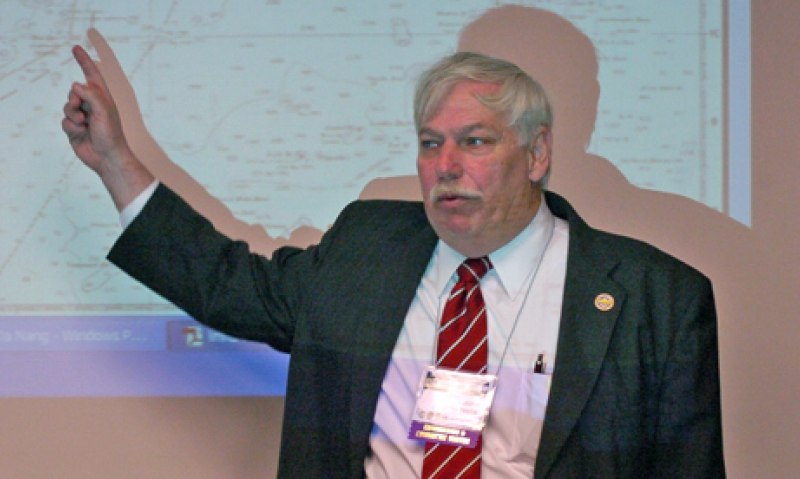
Involved with the program for more than 20 years, Lee Harris shares his insight on The American Legion's National Oratorical Championship Contest.
Over the next few weeks, more than 50 high-school students from across the United States will anxiously prepare their winning speeches for the 73rd National Oratorical Championship Contest that takes place April 9-11 in Indianapolis. In the meantime, longtime volunteer Lee Harris also prepares for the anticipated event by studying the supreme law.
Harris' volunteer efforts with the Legion's Oratorical Contest began more than two decades ago with involvement in handling national media efforts, along with video production for 18 years. But five years ago he switched gears to become an Oratorical judge, a change of pace that has kept him coming back year after year. As a judge, Harris objectively critiques the contestants' speeches while being utterly amazed at how each contestant brings the U.S. Constitution to life.
As a result of being a longtime Oratorical volunteer, Harris has seen it all. The retired 22-year American Legion National Headquarters employee recently spared time away from his studies to speak with The American Legion.
Q: With your commitment to the contest, what gets you excited to come back each year?
A: The thought process of the participants fascinates me, and each contestant seems to come up with attention steps that makes the U.S. Constitution come alive. Also, relevancy is important for the students, and each year we hear current events tied to the root of our form of government.
Q: How do you prep for the position as a judge each year?
A: I re-read the U.S. Constitution a few weeks before the contest. Judges need to at least have a basic understanding of the document in order to spot interpretations, etc., that are not fully supported within the document. However, in my years as a judge, I have never come across a contestant interpreting the document.
Q: Do you have a favorite memory of a particular Oratorical contest?
A: Honestly, after so many years, it is hard to find one speaker or one contest that stands out. As a previous American Legion employee, I was involved with the participants behind the scenes, which gave me the opportunity to get to know them a little better. When you are involved behind the scenes you often see the contestants in a ‘non-contest' environment. Parents, family, speech teachers and others will be nervous and restless, but the speakers do not share that apprehension. I've watched three finalists line dance together across the stage an hour before the final speeches. They are polished and ready, and being in the limelight and feeling stage fright isn't an issue for them.
Q: What advice do you have for a high school student thinking about participating in the Oratorical Contest?
A: Go for it! Really, what do you have to lose? If you are involved in speech, journalism or theater, it's a better way to gain experience in research, writing and public speaking. And, it certainly is a welcome addition to a college application.
Q: As a longtime volunteer, what changes have you seen?
A: As for the biggest change, it would be having the national contest here in Indianapolis. Prior to having the contest in one city year after year, we sent contestants all over the country to compete in the regional, sectional and national contests. Ultimately, the four finalists would compete at a national finals city, the last being in Topeka, Kan., in April 1996.
Having the national contest in the same city year after year simply makes for a much more enjoyable experience for the speakers. Each finalists gets to hear the other contestants' speeches, so not only do they participate, they also experience the event and take away friendships and real life examples that will help shape future speeches.
Q: Besides being an Oratorical judge, what other events or hobbies do you like to partake in?
A: Now that I'm retired, I volunteer at an Indianapolis hospital for joint health. I spend time with patients recovering from hip- and knee-replacement surgery because as a veteran of three replacement surgeries, it's uplifting to be an example for patients on how quality of life will improve. I'm also on the Board of Directors for the Indiana War Memorial Foundation, Inc., and I'm looking forward to a short-term mission trip to Alaska in May, where my wife and I will be volunteering our time with painting, cleaning, planting, etc., to get things ready for an active summer of Christian youth enjoying the outdoors and the fellowship with one another.
- Oratorical

